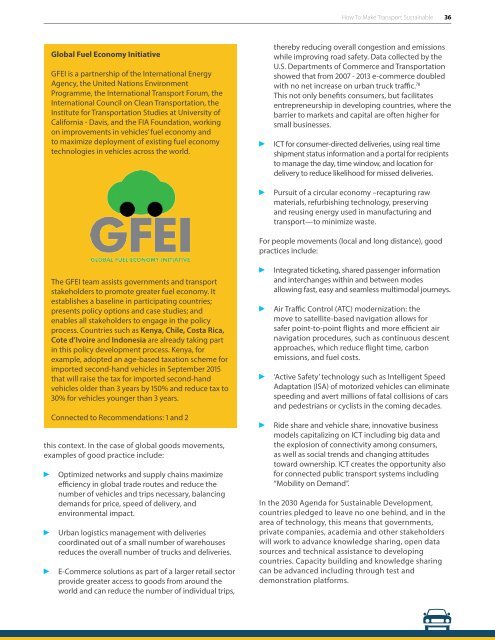MOBILIZING DEVELOPMENT
a5OQ306q56U
a5OQ306q56U
Create successful ePaper yourself
Turn your PDF publications into a flip-book with our unique Google optimized e-Paper software.
How To Make Transport Sustainable 36<br />
Global Fuel Economy Initiative<br />
GFEI is a partnership of the International Energy<br />
Agency, the United Nations Environment<br />
Programme, the International Transport Forum, the<br />
International Council on Clean Transportation, the<br />
Institute for Transportation Studies at University of<br />
California - Davis, and the FIA Foundation, working<br />
on improvements in vehicles’ fuel economy and<br />
to maximize deployment of existing fuel economy<br />
technologies in vehicles across the world.<br />
thereby reducing overall congestion and emissions<br />
while improving road safety. Data collected by the<br />
U.S. Departments of Commerce and Transportation<br />
showed that from 2007 - 2013 e-commerce doubled<br />
with no net increase on urban truck traffic. 78<br />
This not only benefits consumers, but facilitates<br />
entrepreneurship in developing countries, where the<br />
barrier to markets and capital are often higher for<br />
small businesses.<br />
ICT for consumer-directed deliveries, using real time<br />
shipment status information and a portal for recipients<br />
to manage the day, time window, and location for<br />
delivery to reduce likelihood for missed deliveries.<br />
Pursuit of a circular economy –recapturing raw<br />
materials, refurbishing technology, preserving<br />
and reusing energy used in manufacturing and<br />
transport—to minimize waste.<br />
For people movements (local and long distance), good<br />
practices include:<br />
The GFEI team assists governments and transport<br />
stakeholders to promote greater fuel economy. It<br />
establishes a baseline in participating countries;<br />
presents policy options and case studies; and<br />
enables all stakeholders to engage in the policy<br />
process. Countries such as Kenya, Chile, Costa Rica,<br />
Cote d’Ivoire and Indonesia are already taking part<br />
in this policy development process. Kenya, for<br />
example, adopted an age-based taxation scheme for<br />
imported second-hand vehicles in September 2015<br />
that will raise the tax for imported second-hand<br />
vehicles older than 3 years by 150% and reduce tax to<br />
30% for vehicles younger than 3 years.<br />
Connected to Recommendations: 1 and 2<br />
this context. In the case of global goods movements,<br />
examples of good practice include:<br />
Optimized networks and supply chains maximize<br />
efficiency in global trade routes and reduce the<br />
number of vehicles and trips necessary, balancing<br />
demands for price, speed of delivery, and<br />
environmental impact.<br />
Urban logistics management with deliveries<br />
coordinated out of a small number of warehouses<br />
reduces the overall number of trucks and deliveries.<br />
E-Commerce solutions as part of a larger retail sector<br />
provide greater access to goods from around the<br />
world and can reduce the number of individual trips,<br />
Integrated ticketing, shared passenger information<br />
and interchanges within and between modes<br />
allowing fast, easy and seamless multimodal journeys.<br />
Air Traffic Control (ATC) modernization: the<br />
move to satellite-based navigation allows for<br />
safer point-to-point flights and more efficient air<br />
navigation procedures, such as continuous descent<br />
approaches, which reduce flight time, carbon<br />
emissions, and fuel costs.<br />
‘Active Safety’ technology such as Intelligent Speed<br />
Adaptation (ISA) of motorized vehicles can eliminate<br />
speeding and avert millions of fatal collisions of cars<br />
and pedestrians or cyclists in the coming decades.<br />
Ride share and vehicle share, innovative business<br />
models capitalizing on ICT including big data and<br />
the explosion of connectivity among consumers,<br />
as well as social trends and changing attitudes<br />
toward ownership. ICT creates the opportunity also<br />
for connected public transport systems including<br />
“Mobility on Demand”.<br />
In the 2030 Agenda for Sustainable Development,<br />
countries pledged to leave no one behind, and in the<br />
area of technology, this means that governments,<br />
private companies, academia and other stakeholders<br />
will work to advance knowledge sharing, open data<br />
sources and technical assistance to developing<br />
countries. Capacity building and knowledge sharing<br />
can be advanced including through test and<br />
demonstration platforms.


